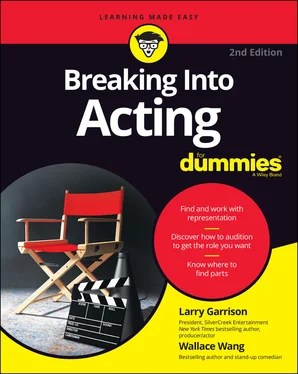Here, you get a quick peek at what you need to succeed as an actor, whether you live in London, Los Angeles, or Lima, Ohio. You can see how actors market themselves by using a head shot, a resume, their representation, and the Internet, and how persistence and determination are the real secrets that can help you break into show business faster than you may think. If you ever thought that you could be an actor, you can. And this chapter gives you a brief introduction to that wonderful world of show business.
Understanding the World of Acting
If you want to succeed in show business as an actor, you need to learn how to act. But you also need to be familiar with the business side of show business.
Every year, thousands of hopefuls flock to Los Angeles and New York. And every year, thousands of these same hopefuls wind up disappearing into obscurity. The reasons are simple. Many aspiring actors embark on their career without knowing how show business works. So before you quit your job, pack up your bags, and move to Hollywood or Broadway to become tomorrow’s next big star, take a sneak-peek behind the production curtain in Chapter 2. Then take a look at Chapter 3, which introduces you to the movers and shakers of show business who can open doors for you.
If the thought of spending years studying acting, working in bit roles, and getting paid sporadically (if at all) depresses you, maybe acting isn’t for you. On the other hand, if you truly enjoy acting for the sake of acting, the previously mentioned obstacles will be nothing more than minor nuisances on your way to success — whatever form that success may ultimately take.
Every successful actor has to have two skills:
A certain amount (but not necessarily a lot) of acting talent, which usually comes from a combination of natural ability and constant training.
Knowing how to market yourself as a product is essential.
As an actor, you’re a salesperson, and the product that you’re selling is you. In order to sell yourself to the people in position to pay for your product (you as an actor), you need a head shot (so people know what you look like), a resume (so people know what experience and skills you have), and the necessary talent to wow a casting director when you audition for a role.
An attention-grabbing head shot
Talent and determination can increase the odds that you’ll succeed in show business, but until people know who you are, you’re just another face in the crowd. Because you can’t possibly introduce yourself to everyone who may be able to advance your career, you have to use a head shot instead.
 A head shot is a photograph that acts as your calling card by displaying your face for others to see when you can’t be present physically. Your head shot should capture your best physical features in order to make casting directors and agents say to themselves, “I’ve got to meet this person!”
A head shot is a photograph that acts as your calling card by displaying your face for others to see when you can’t be present physically. Your head shot should capture your best physical features in order to make casting directors and agents say to themselves, “I’ve got to meet this person!”
 Have multiple head shots that look like you and represent your comedic (smiling) and theatrical side (serious). Some actors portray different characters that they’re likely to be cast in their head shots. For instance, if you’re going to play a gang member, have a picture showing that different side of you. Not every casting director or producer will have a wild imagination to cast you in certain roles.
Have multiple head shots that look like you and represent your comedic (smiling) and theatrical side (serious). Some actors portray different characters that they’re likely to be cast in their head shots. For instance, if you’re going to play a gang member, have a picture showing that different side of you. Not every casting director or producer will have a wild imagination to cast you in certain roles.
Because head shots can be such a crucial promotional tool, you absolutely must have the best head shot possible, which means finding the best photographer and developing a specific image for your head shot to project. In Chapter 4, you can find out how to choose a photographer, what to wear during your photography session, and how to look your absolute best, so that your head shot highlights your unique personality.
A five-star acting resume
While your head shot projects your physical characteristics, a resume lists the acting experience and unique skills behind your attractive face. After seeing an actor’s head shot, casting directors often study an actor’s resume to see whether that actor has the ability to perform in a particular role.
A good acting resume answers any questions a casting director may have about an actor’s ability to play a certain role and supplies enough evidence to convince a casting director to choose you. The resume is then secondary to the actual audition. Chapter 5discusses ways to create an award-winning resume, whether you’re a complete novice, a seasoned veteran, or someone in-between. (Psst, Chapter 5also shows you what to put on your resume and what to leave off to increase your chances of making a great first impression.) By knowing how to create and present your acting experience and skills in the best light possible, you can use your resume to help you land roles again and again.
Everyone has some talent for acting (think of the last time you called in to work and pretended to be sick so that you could take the day off). Even if you have astounding natural acting talent, you should still want lessons or coaching to nurture and further develop that talent (see Chapter 6for more information on improving your acting skills with training). Here are some of the different ways to polish your acting talent:
Majoring in drama in school
Attending an acting class or workshop
Working with an acting coach
Learning on the job
Finding out how to film a professional audition tape
If you’re serious about becoming an actor and you’re already in school, you can’t get any better training than performing in your high school or college drama department. Not only does such exposure give you an idea how much fun (and how much of a pain in the neck) acting can be, but it can also teach you all the technical details necessary to put on a play, ranging from creating backdrops and building sets to sewing costumes and marketing the show.
If you’ve already graduated or just want to jump right into the world of acting as soon as possible, you can choose from plenty of acting workshops, classes, and coaches available for varying prices. Once again, some acting teachers have better reputations than others, and some charge outrageous amounts of money while others are more reasonable. Chapter 6gives you tips on how to pick a workshop or acting coach that’s right for you.
 The best way to develop your acting skills is to keep looking for acting roles wherever you can find them, whether they’re lead roles in small plays or bit roles in larger productions. The Internet now plays a major role in giving you the ability to see what producers and casting directors are looking for in upcoming projects. The more experience and knowledge you can gain by acting in a real role and watching others perform, the more you’ll discover about the world of acting that no class or coach can ever duplicate. A famous acting coach, Lee Strasberg, taught me (Larry) to go out and study individuals in my environment that I may replicate in future roles.
The best way to develop your acting skills is to keep looking for acting roles wherever you can find them, whether they’re lead roles in small plays or bit roles in larger productions. The Internet now plays a major role in giving you the ability to see what producers and casting directors are looking for in upcoming projects. The more experience and knowledge you can gain by acting in a real role and watching others perform, the more you’ll discover about the world of acting that no class or coach can ever duplicate. A famous acting coach, Lee Strasberg, taught me (Larry) to go out and study individuals in my environment that I may replicate in future roles.
Taking Your First Steps in Show Business
How did big stars like Meryl Streep, Tom Hanks, Gabrielle Union, Al Pacino, Octavia Spencer, Ben Affleck, Denzel Washington, Julia Roberts, and Angelina Jolie break into show business? They all started as beginners. So as an aspiring actor, you too can follow in the footsteps of the most successful actors in the world if you figure out what to do first and how to get started. Who knows? Within a few years, people may be clamoring for your autograph. The following sections help you get started.
Читать дальше

 A head shot is a photograph that acts as your calling card by displaying your face for others to see when you can’t be present physically. Your head shot should capture your best physical features in order to make casting directors and agents say to themselves, “I’ve got to meet this person!”
A head shot is a photograph that acts as your calling card by displaying your face for others to see when you can’t be present physically. Your head shot should capture your best physical features in order to make casting directors and agents say to themselves, “I’ve got to meet this person!” Have multiple head shots that look like you and represent your comedic (smiling) and theatrical side (serious). Some actors portray different characters that they’re likely to be cast in their head shots. For instance, if you’re going to play a gang member, have a picture showing that different side of you. Not every casting director or producer will have a wild imagination to cast you in certain roles.
Have multiple head shots that look like you and represent your comedic (smiling) and theatrical side (serious). Some actors portray different characters that they’re likely to be cast in their head shots. For instance, if you’re going to play a gang member, have a picture showing that different side of you. Not every casting director or producer will have a wild imagination to cast you in certain roles.










